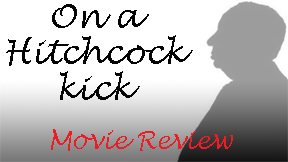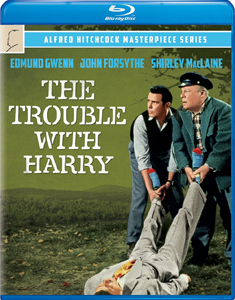“Mr. and Mrs. Smith” (1941) is infamously Alfred Hitchcock’s worst film because he operates like a hired hand, efficiently making a standard, unfunny rom-com. The director’s next outright crack at chuckles, “The Trouble with Harry” (1955), is much better because this is Hitch’s own sense of humor.
As we know from watching Hitch’s interviews and showmanship PR spots – which became more common around this point – he had a macabre, idiosyncratic sense of the absurd. When he said he viewed “Psycho” as a comedy, he wasn’t pulling our leg.
But usually, he didn’t let his secret notion about the inherent silliness of cinema cut into the suspense, and that’s definitely a good thing. An exception is “The Trouble with Harry,” which foregrounds the comedy. However, for a one-off film, I’ll allow it.

“The Trouble with Harry” (1955)
Director: Alfred Hitchcock
Writers: John Michael Hayes (screenplay), Jack Trevor Story (novel)
Stars: John Forsythe, Shirley MacLaine, Edmund Gwenn
The lighter side of Hitchcock
Written by John Michael Hayes from a novel by Jack Trevor Story, “Harry” nails its aims of fairy-dusting a Hitch scenario with winking, farcical comedy. This is clear off the bat when rabbit pot-shooter Capt. Wiles (Edmund Gwenn) comes upon the titular body in the woods, believes he has accidentally killed him, and treats the situation like bunnies nibbling at his flower garden.
The corpse is an annoyance that can’t be ignored, but moral conundrums about killing a man and the appropriate response are buried, and empathy toward Harry (whose face is usually hidden) is totally absent. This seemingly would make “Harry” into a pitch-black precursor to “Weekend at Bernie’s,” but when single mother Jennifer (Shirley MacLaine in her debut) also comes across the body and is untroubled, the film hits a rich vein of light dark humor.
As Hitch perhaps unfortunately sets aside a true feeling of suspense in order to make fun of the genre, he shows his directing skills in two unusual areas. First, he needs specifically farcical – but not too farcical – performances from everyone, and he gets them.
Hayes’ screenplay helps with ridiculous scenarios and quick one-liners, as everyone is immersed in various small-town ephemera, with Harry’s corpse merely a curious bother. Sam (John Forsythe), an artist unable to sell his work, gets distracted with wanting to give Miss Gravely (Mildred Natwick) a youthful makeover, so he fails to notice the millionaire right in front of him who wants to buy all his paintings.
The captain, meanwhile, has designs on Mildred, and acknowledges if he was two years younger, he’d have a better shot. Gwenn was 28 years older than Natwick, and this is clear even with Miss Gravely being frumpy, so the line completes the visual joke.
Vermont in VistaVision
Second, Hitch shows he can embrace the outdoors if he wants to. (He usually didn’t want to.) “Harry” is shot amid a Vermont autumn; the colors are vibrant in VistaVision and Bernard Herrmann delivers a Rockwellian score you could float away on. It’s a shame Hitch didn’t shoot on location more often; it’s one of the reasons I hate “The Birds” – a film about nature made on soundstages with yellow screens, composited action and matte paintings.
I’m not a big fan of farces, and certainly we get the central joke of “Harry” early and often: A corpse causes problems because of its existence. The fact that the captain and Sam have to dig up and rebury Harry several times is an amusing additional layer. And I can’t deny the pleasant scenery and appealing lightness to the proceedings.
The trouble with “The Trouble with Harry” is that I don’t desire to rewatch it to the degree of his elite suspensers. It executes its aims precisely like it intends to, and it’s a nice artifact of Hitch’s distinct sense of humor. The fact that it exists is not objectionable, like with “Mr. and Mrs. Smith.” But it has about as much weight as an autumn leaf on the breeze.
RFMC’s Alfred Hitchcock series reviews works by the Master of Suspense, plus remakes and source material. Click here to visit our Hitchcock Zone.


